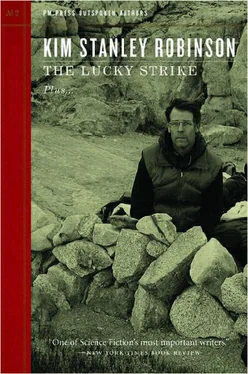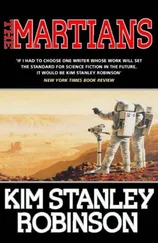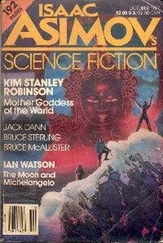Were you ever close to any of the “old-timers” in SF? Which ones? What did you get from them?
Not really close, but I loved the several interactions I had with Jack Williamson, one of the kindest, smartest people in writing, modest but incisive. He published science fiction from 1928 to 2008—isn’t that eighty years? I’m having trouble believing my math. Anyway he was great.
I’ve met Asimov and Bradbury, and talked with Clarke on the phone, and they are all generous friendly people. I guess I get from them the sense that the community is a real community, that the people in it function like neighbors in a small town, helpful to the young people.
Your first big trilogy was the Orange County ( Wild Shore ) series. Did you feel you owed that to your birthplace or was it because Orange County California somehow concentrates all the tendencies good and bad in modern America?
That trilogy is called Three Californias , as the handsome Tor trade paperbacks say. I guess it was a little of both. I wanted to ground some of my science fiction in my actual home town, and I also felt like I was the beneficiary of a lucky coincidence, in that my home town seemed to me to represent some kind of end case for America, some kind of future already here for the rest of the country to witness and hopefully avoid following. I’m not sure that was a true perception, but it had to do with the westward movement in American history, and the fact that when people reached the Pacific there was no where else to go, so the leading edge of malcontents and dreamers was stuck there and had to make something of it. LA is the big exemplar of how that can go wrong, San Francisco how it can go right, and Orange County is like the purest expression of LA. And in my time it was so beautiful, then it was so destroyed, and it was so drugged out; it seemed a good spot to talk about America, so I used it. It still feels like a lucky thing, and I think it was fundamental to me becoming a science fiction writer in the first place. When I ran into science fiction at age eighteen, I said, Oh I recognize this, this is home, this is Orange County.
My favorite of that series is Pacific Edge , the Utopia. What’s yours? Are there any particular problems in writing a Utopia?
My favorite is The Gold Coast , for personal reasons, but I think Pacific Edge is more important to us now. Anyone can do a dystopia these days just by making a collage of newspaper headlines, but utopias are hard, and important, because we need to imagine what it might be like if we did things well enough to say to our kids, we did our best, this is about as good as it was when it was handed to us, take care of it and do better. Some kind of narrative vision of what we’re trying for as a civilization. It’s a slim tradition since More invented the word, but a very interesting one, and at certain points important: the Bellamy clubs after Edward Bellamy’s Looking Back from the Year 2000 had a big impact on the Progressive movement in American politics, and H.G. Wells’s stubborn persistence in writing utopias over about fifty years (not his big sellers) conveyed the vision that got turned into the postwar order of social security and some kind of government-by-meritocracy. So utopias have had effects in the real world. More recently I think Ecotopia by Callenbach had a big impact on how the hippie generation tried to live in the years after, building families and communities.
There are a lot of problems in writing utopias, but they can be opportunities. The usual objections, that they must be boring, are often political attacks, or ignorant repeating of a line, or another way of saying “No expository lumps please, it has to be about me.” The political attacks are interesting to parse. “Utopia would be boring because there would be no conflicts, history would stop, there would be no great art, no drama, no magnificence.” This is always said by white people with a full belly. My feeling is that if they were hungry and sick and living in a cardboard shack they would be more willing to give utopia a try. And if we did achieve a just and sustainable world civilization, I’m confident there would still be enough drama, as I tried to show in Pacific Edge . There would still be love lost, there would still be death. That would be enough. The horribleness of unnecessary tragedy may be lessened and the people who like that kind of thing would have to deal with a reduction in their supply of drama.
So, the writing of utopia comes down to figuring out ways of talking about just these issues in an interesting way; how tenuous it would be, how fragile, how much a tightrope walk and a work in progress. That along with the usual science fiction problem of handling exposition. It could be done, and I wish it were being done more often.
Your two early “stand-alones” anticipated some later themes: super-longevity and terraforming in Icehenge . And in Memory of Whiteness the exploration of ten-dimensional space. What keeps you coming back to these themes?
I like the super-longevity theme because I’d like to live five hundred years, and also from time to time when I think back on my past, it feels like I’ve lived five hundred years, so it works as both wish and metaphor.
And the whole thrust of medicine leads toward that wish, I think. So it’s good science fiction. Same with terraforming Mars, which is very achievable, and even the idea of terraforming other places is interesting to contemplate. It’s also a good metaphor for what we now have to do here on Earth, for the rest of human time. As for ten-dimensional space, physicists keep coming back to it, ever since Kaluza and Klein in the twenties, and I keep thinking, what the heck can it mean? It seems to stand in for all the deep weirdness of modern physics and what they are saying about this world we live in, but apparently don’t see very well. Also, if you have foolishly taken on a time travel story, it’s the only way to make it look like it makes sense.
Are you sorry Pluto is no longer a planet?
No, not at all. I think it’s a good lesson in words.
These books came out at about the same time as the Three Californias . Were they written earlier? Or in between?
I somewhat wrote them all at once, or overlapping through those years. It went something like, Icehenge part 3, Memory of Whiteness early drafts, Icehenge part 1, Wild Shore , Icehenge part 2, and Memory of Whiteness final drafts. The Gold Coast and Pacific Edge came later.
You once said that a writer had to perch on a three-legged stool. I think (!) you meant that you had three readerships: the SF community, the science community, and the more “literary” types. Does that still work for you?
Yes, I think that might describe the three parts of my adult audience, although I think college students and high school students form a group as big as any of these three. Also, leftists, environmentalists, and wilderness people. I like all these readerships very much, indeed I am deeply grateful to them, as providing me my career and my sense of myself as a writer. I’m not a writer without them. So, thinking of the SF community as my home town, I guess I think of the “literary” community as another small town, with pretensions, while scientists are the real big city, but they tend to act like a big city, in that they don’t know each other and usually don’t read fiction; so word of mouth doesn’t work as well there as in the other communities. Younger readers use word of mouth and also listen to their teachers, a bit, so they are crucial. Getting word to people who would enjoy my books if they were to give them a try; this is the big problem, and ultimately it comes down to word of mouth. So again I depend on my readership. It’s a real dependency!
Читать дальше












